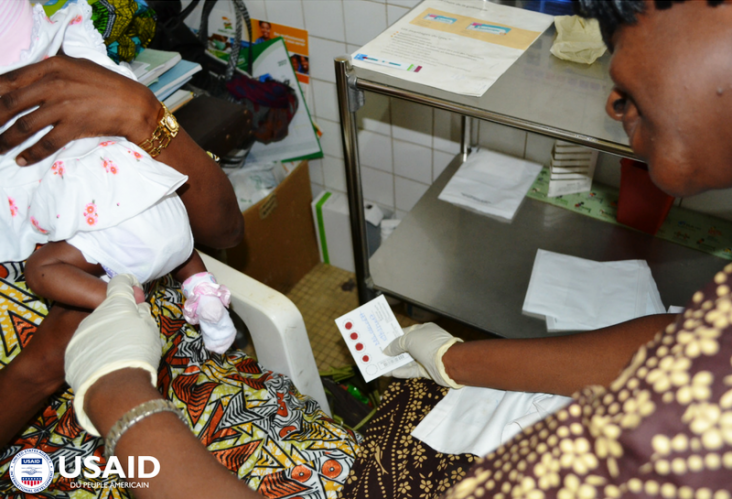
March 2017—ABIDJAN, Côte d’Ivoire—On March 9, Adèle*, 39, and her 6-week-old baby come to Abobo General Hospital, located in the north of Abidjan, Côte d’Ivoire’s capital city, for a postnatal care checkup. Dried blood spots are collected from the baby’s heel for an HIV PCR (polymerase chain reaction) test, a routine test for all babies born to HIV-positive mothers. The test ensures early diagnosis of HIV infection to improve the survival and quality of life of HIV-exposed babies.
During her prenatal examination, Adèle tested HIV-positive. Of course, the news was devastating, and she felt helpless and hopeless for the baby she was carrying. Ever since she received her diagnosis, the aid workers—her sisters as she calls them—have been following up with her through regular phone calls and visits to her home, giving her all the support she needs. Adèle also has a 10-year-old daughter who is HIV-negative.
Just like Adèle, HIV-positive mothers can receive testing, counseling and treatment with antiretroviral therapy medication every day and get test results a month later at the hospital. Previously, testing was available only once a week and results were available in three months. With 1 million residents, Abobo is one of the most populated communes in the country.
With funding from the President's Emergency Plan for AIDS Relief (PEPFAR), USAID’s Applying Science to Strengthen and Improve Systems (ASSIST) project works with the Ivorian Ministry of Health to provide technical expertise to partners. Abobo General Hospital, along with around 105 other PEPFAR-supported facilities and four university hospitals, established a quality improvement system in October 2015 to improve HIV and AIDS care.
Training was provided to a quality improvement team that was formed at the hospital in 2014, and a social worker was dedicated to collecting dried blood spots from HIV-exposed infants. In September 2016, the hospital registered a 100 percent retention rate for babies who had been confirmed by the hospital as being HIV-exposed. That is, all infants born to HIV-positive mothers continued to receive care after their early HIV test at six to eight weeks, including preventive treatment with cotrimoxazole to prevent opportunistic infections, and another test at 18 months if breastfeeding has stopped. If a newborn tests positive for HIV, they receive antiretroviral drug treatment.
“More and better quality contacts between women and their health providers throughout pregnancy facilitate the uptake of preventive measures,” says Dr. Solange Amon, head of the quality team and HIV focal point at the hospital.
Monthly meetings are chaired by the hospital director, with a point of contact from each department. The meetings allow the hospital to identify problems, bottlenecks and solutions. Overall, HIV service delivery and data quality have significantly improved.
USAID’s ASSIST project, which runs from 2013 to 2017, supports Côte d’Ivoire’s national HIV care and treatment program to improve health service delivery to people living with HIV and to build local leadership and ownership. The program has improved services to more than 15 million people in 30 districts.
*Last name withheld to protect privacy.
LINKS
Follow us @USAIDAfrica, on Facebook, on Flick







Comment
Make a general inquiry or suggest an improvement.